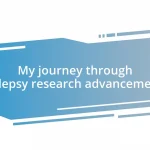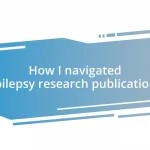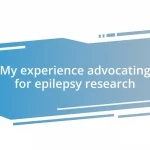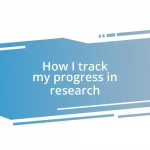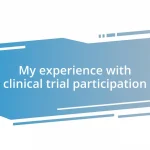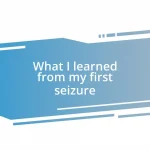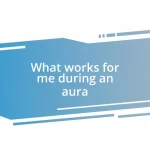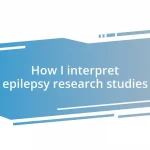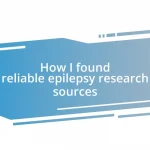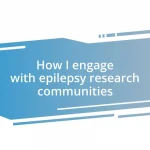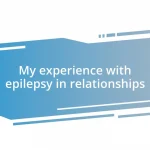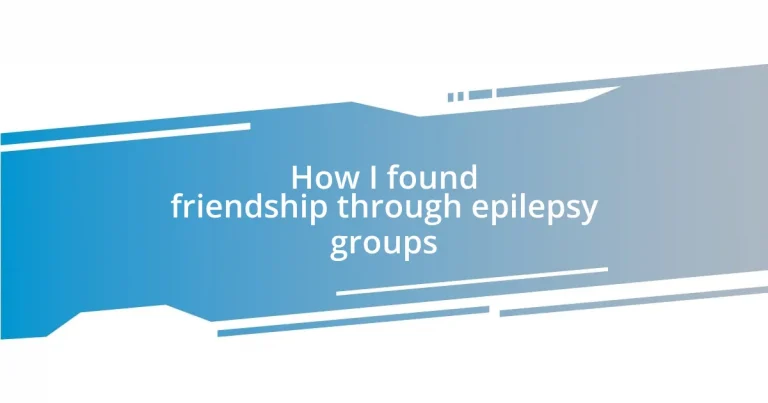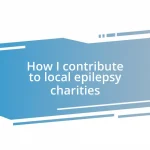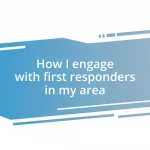Key takeaways:
- Epilepsy involves physical and emotional challenges, often leading to feelings of isolation and anxiety about unpredictability.
- Joining local epilepsy support groups can provide a sense of belonging and valuable connections with others who share similar experiences.
- Sharing personal stories enhances trust and intimacy, creating deeper bonds among group members.
- Maintaining friendships beyond the group fosters understanding and enriches relationships through shared interests and casual interactions.
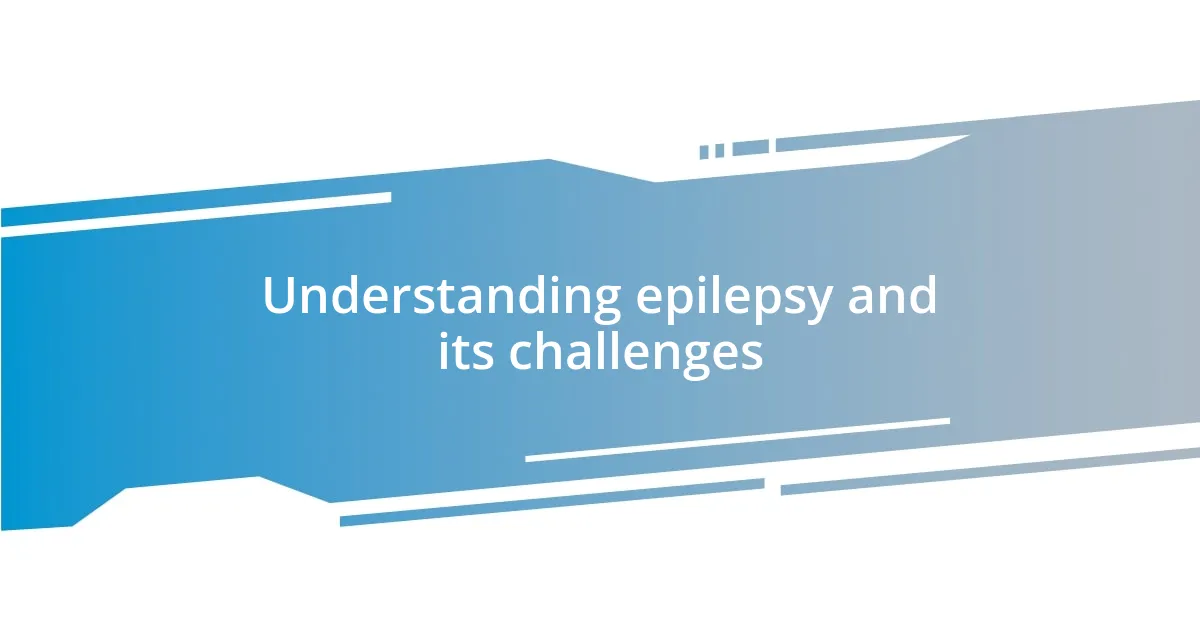
Understanding epilepsy and its challenges
Epilepsy is not just a medical condition; it’s a journey filled with uncertainty and fear. I remember my first seizure vividly; it left me bewildered and worried about what would happen next. How do you explain such an experience to someone who has never witnessed it? There’s a vulnerability that comes with epilepsy, especially when you consider the stigma that surrounds it.
Living with epilepsy often means confronting not only physical challenges but also emotional ones. I’ve felt isolated, especially when friends couldn’t understand why I would suddenly need to leave a gathering or skip an outing. Have you ever felt that sense of detachment, as if you’re on the outside looking in? That feeling can be painfully acute for someone with epilepsy.
Moreover, the unpredictability of seizures can cast a long shadow over daily life. Every day brings the question of when the next episode might strike, which can lead to anxiety and stress. When I found myself avoiding certain social situations, I realized that it was impacting my relationships. How can we foster connections while navigating such unpredictability? This struggle is something many in the epilepsy community face, and it’s crucial to talk about it.
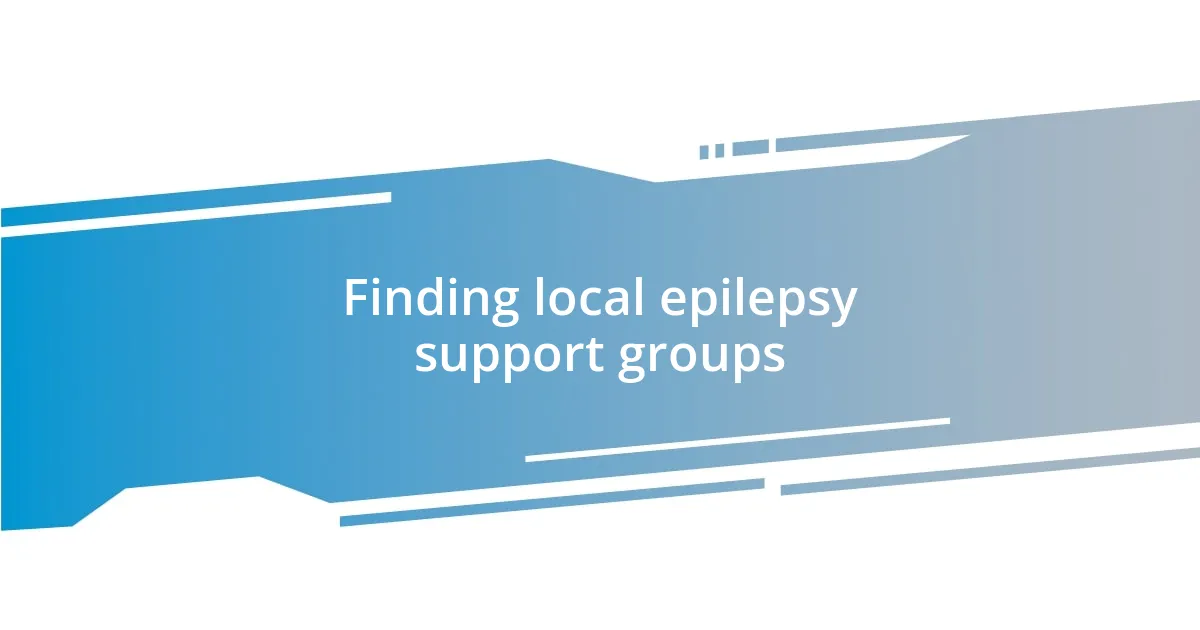
Finding local epilepsy support groups
Finding local epilepsy support groups can feel daunting, but it’s truly rewarding. I remember feeling lost in a sea of confusion and fear until I stumbled upon a local meet-up advertised in my community center. That first meeting was nerve-wracking; I arrived early, heart racing, but as I walked in, the welcoming smiles of others who shared my experiences made me feel like I had finally found my tribe.
Searching online can also yield good results. I joined several social media groups dedicated to epilepsy awareness, and after posting a simple query, I received a flood of suggestions for local support groups. It was eye-opening to see how many people were willing to share their experiences and resources. Sometimes, we just need to ask, and that can lead us to amazing connections.
Moreover, don’t overlook healthcare providers or advocacy organizations. I once chatted with my neurologist about finding support, and he provided me with a list of reputable local groups. These professionals often have the best insights into which communities are active and supportive. By reaching out, I not only discovered a group but also developed friendships that truly understand the journey of living with epilepsy.
| Source | Details |
|---|---|
| Community Center | Local meet-ups offering support and friendship. |
| Social Media | Online groups where people share local resources. |
| Healthcare Providers | Professionals can recommend support groups. |
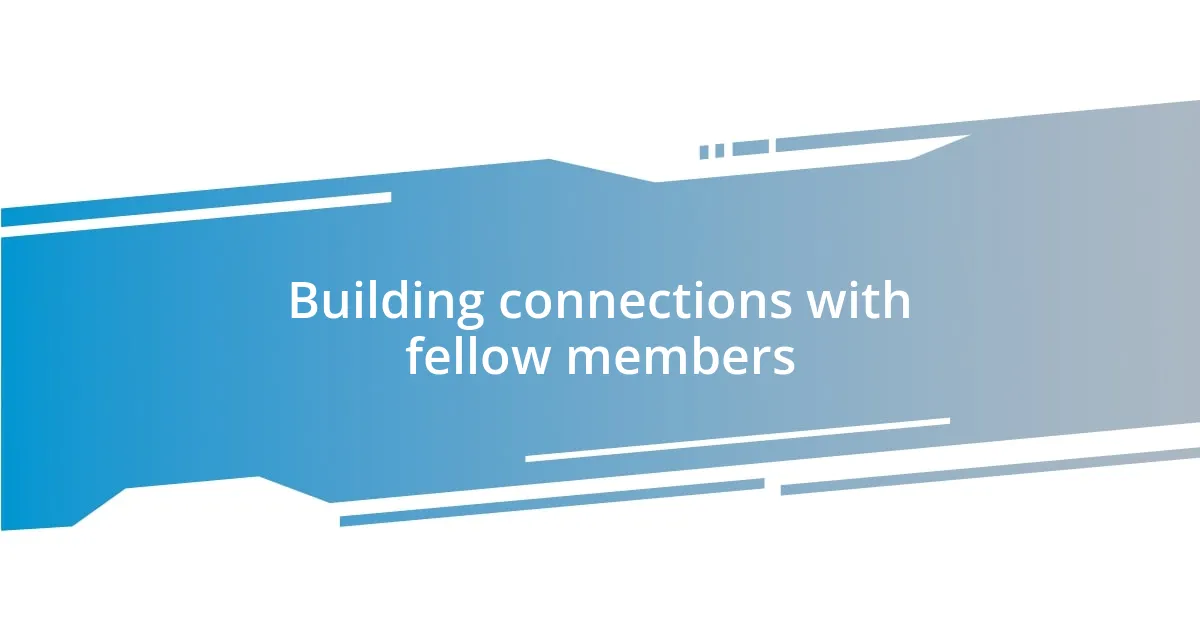
Building connections with fellow members
Building connections within epilepsy groups can be one of the most rewarding experiences. I remember attending my first support group session, not knowing anyone and feeling a mix of excitement and apprehension. As soon as the conversation began, I was surprised by how easily I bonded with others. Sharing personal stories and laughing about the little quirks of living with epilepsy created a shared understanding that instantly made me feel less alone.
One of the most powerful moments came when someone shared their experience with a new medication that had helped reduce their seizures. I found myself nodding along, feeling a rush of connection as they articulated thoughts I had often struggled to express. Moments like that—where vulnerability meets camaraderie—are where true friendships blossom. Here are some ways to deepen those connections:
- Share personal stories: Opening up fosters trust and strengthens bonds.
- Participate in group activities: Whether it’s a casual dinner or a wellness workshop, shared experiences build memories.
- Stay engaged outside meetings: Simple gestures like sending messages or sharing articles can enhance connections.
- Discuss coping strategies: Exchanging tips on managing epilepsy creates a sense of teamwork and camaraderie.
The warmth and acceptance I found among group members reshaped my entire perspective on living with epilepsy. Each interaction was a reminder that I wasn’t just a patient—I was part of a community.
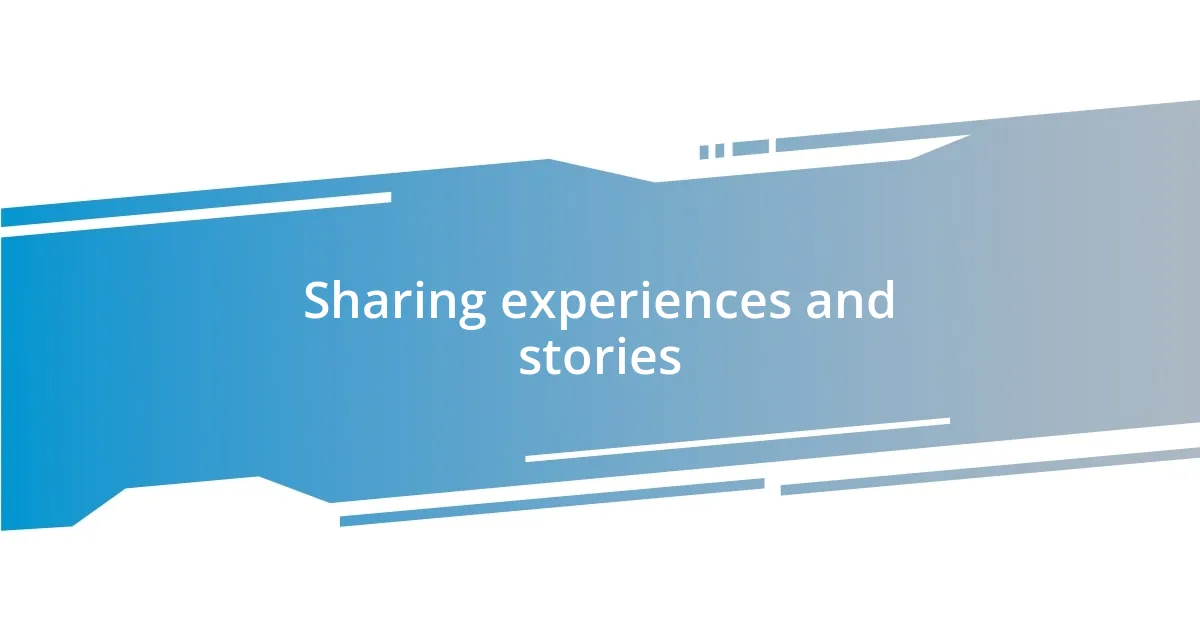
Sharing experiences and stories
Sharing experiences and stories within epilepsy groups is incredibly powerful. I still remember the first time I heard someone describe their experience with an early seizure in vivid detail. It was as if they’d pulled the words straight from my own mind. Listening to others’ stories slowly unraveled the isolation I’d felt for so long. Have you ever had a moment where someone else’s words felt like a mirror, reflecting your own struggles? Those instances can create an instant bond that sets the stage for deeper connections.
Every time we share our journeys, it feels like lifting a heavy weight off our shoulders. I once recounted a particularly challenging day I had while managing my condition, and the nods around the room felt validating. What surprised me was the rush of intimacy that created among us. It was clear then that vulnerability breeds trust, and trust lays the foundation for friendships. How often do we dismiss our stories as mundane, not realizing that they might resonate deeply with someone else?
After sharing my experiences, I realized the importance of listening in return. There’s something so enriching about hearing diverse perspectives on coping strategies. For instance, I learned a fantastic breathing technique from a fellow member that has since become one of my go-to tools during anxious moments. This exchange of ideas and stories not only deepens connections but also fills my toolkit for managing epilepsy. Isn’t it amazing how sharing can be a catalyst for personal growth and friendship?
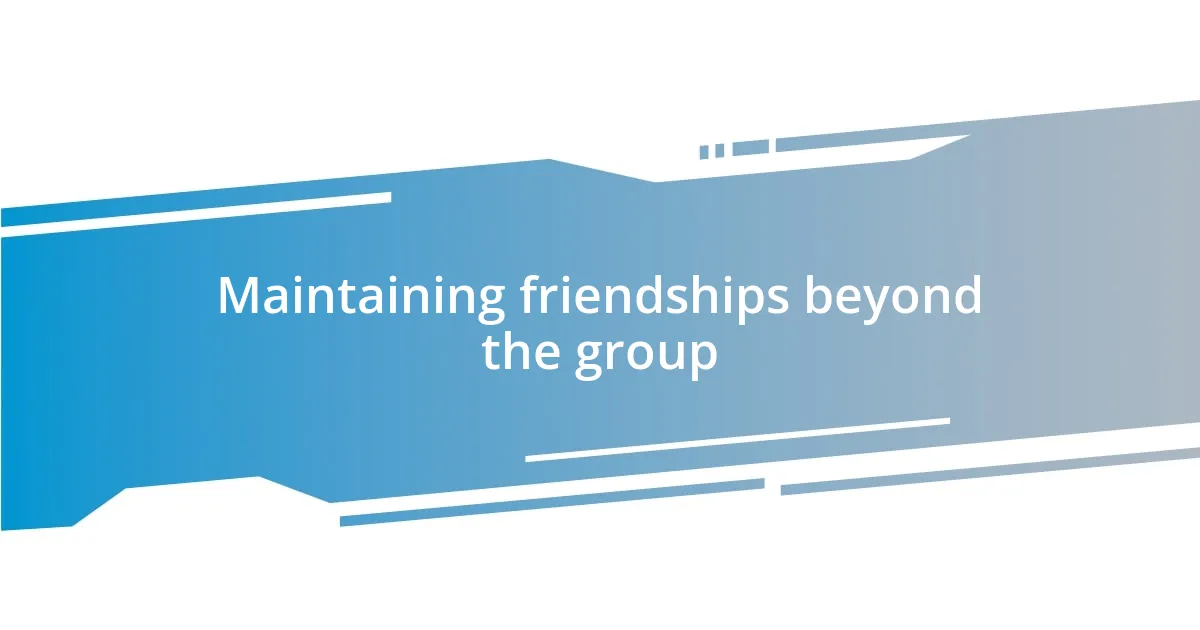
Maintaining friendships beyond the group
Maintaining friendships beyond the epilepsy group can be both enriching and challenging. After our meetings, I often found myself texting a few friends to check in, and it amazed me how those simple messages could keep our bond alive. I remember a time when one of my friends reached out just to discuss a funny meme that reminded them of my last seizure story. It felt wonderful to blend our sense of humor with our experiences—they weren’t just my support group, they were becoming genuine friends.
One way I’ve nurtured these relationships is by setting up regular “catch-up” calls or coffee dates. It’s surprising how impactful these informal conversations can be; they allow us to transition from sharing struggles to discussing our lives outside of epilepsy. During one of these chats, I discovered that my friend had taken up painting as a way to express their emotions. Hearing them talk passionately about their newfound hobby opened a door to a whole new side of our friendship, highlighting that our lives are multi-faceted beyond our condition. Have you ever experienced a moment where you realized your friend had passions outside of their health struggles? Those moments can enrich our relationship tenfold.
I’ve also found that creating shared hobbies can be incredibly beneficial. For instance, I joined a book club with a couple of friends from the group. It allowed us a chance to connect over new topics that didn’t focus solely on our epilepsy, but rather on our thoughts and opinions about the latest reads. I can’t stress enough how much this small shift invigorated our friendships; suddenly, we weren’t just discussing our health, but also the plots and characters that made us laugh, cry, and think. Isn’t it amazing how shared interests can sow the seeds for lasting friendships that extend beyond the walls of our support group?
